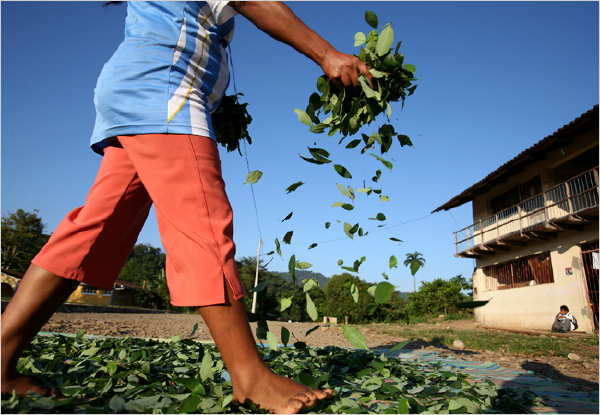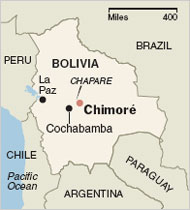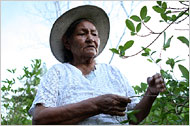
(above) Bolivian farmers dry coca leaves, the raw ingredient for cocaine, before selling them at a market. (photo: Noah Friedman-Rudovsky for The New York Times)
Bolivian Is an Uneasy Ally as U.S. Presses Drug War
August 28, 2008 - New York Times
By SIMON ROMERO
CHIMORÉ, Bolivia -- The refrain here in the Chapare jungle about Americans is short but powerful: "Long Live Coca, Death to the Yanquis!"
So when President Evo Morales recently came to the area, raising his fist and shouting those words before his supporters, the irony was not lost on an elite wing of the Bolivian military that survives on American support.
"We depend on the Americans for everything: our bonuses, our training, our vehicles, even our boots," Lt. Col. José Germán Cuevas, the commander of a Bolivian special forces unit that hunts down cocaine traffickers, said at a military base here in central Bolivia.

(left) Limits for coca growers have helped towns like Chimoré
With Vietnam-era Huey helicopters donated by the United States swirling above the base and dozens of Bolivian officers who have been trained alongside the Green Berets at the School of the Americas in Fort Benning, Ga., Bolivia ranks among the most muddled fronts of the Andean drug war.
Mr. Morales, a former grower of coca, the raw ingredient of cocaine, is both an antagonist and an active partner in American antidrug policy for the region. He often describes the United States as his leading adversary and has made the right to grow the coca leaf a top symbol of sovereignty and anti-imperialism.
Yet he has also gone to unexpected lengths to restrain coca cultivation, and he accepts about $30 million a year from the United States -- almost his entire antinarcotics budget -- to fight cocaine.
For now, Mr. Morales and the United States remain uneasy bedfellows. Mr. Morales has been hesitant to sever ties with the United States, especially since it provides Bolivia with about $100 million in development aid each year. It also grants duty-free access for Bolivian textiles, an economic lifeline for his country.
On the American side, officials argue that a sharp increase in coca cultivation could drive more cocaine to the United States, even though it is currently a negligible market for Bolivian cocaine. A deeper reason may be that the antidrug money gives them a rare window into Mr. Morales's government.
But this cooperation is coming under increasing strain. Radical parts of Mr. Morales's political base, instrumental in bringing him to power, are chafing at American anti-coca policies, especially here in the Chapare, where coca growers expelled American aid workers last month amid claims that they were conspiring to topple Mr. Morales's government.
Tensions are raw in the capital, La Paz, as well. Two months ago a mob of 20,000 protesters marched to the gates of the American Embassy, clashing with the police and threatening to burn the building down, prompting the State Department to temporarily recall Ambassador Philip S. Goldberg in protest. After the episode, Mr. Morales praised the demonstrators.
"Evo Morales simply cannot accede to U.S. demands after being democratically elected by a large mass of angry and hungry Indian peasants who see no real alternatives for themselves and their children," said Bruce Bagley, an expert on Andean drug policies at the University of Miami.
But in a drug war in which contradictions abound, Mr. Morales is doing better than antinarcotics experts feared when he rose to power.
At the time, some warned that his presidency would usher in a return to the early 1980s, when military rulers allowed coca output to surge in the Chapare, destabilizing the country. But Mr. Morales has been eager to show that he does not run a narco-state, and working with the Americans helps bolster his international legitimacy.
Cultivating Coca
Coca cultivation has increased during his two years in office, but instead of booming, it has simply climbed, up 8 percent in 2006 and 5 percent in 2007, according to the United Nations.
That still places Bolivia far behind the world's largest coca producer, Colombia. Despite being the Bush administration's most ardent ally in the region, Colombia had a 27 percent increase in coca cultivation last year, and remains the top source of cocaine smuggled to the United States.
While American officials publicly congratulate Mr. Morales for keeping cultivation from exploding, they are privately pointed in their criticism. "Let's put it this way: It's going in the wrong direction," said an American official at the United States Embassy in La Paz about Mr. Morales's drug policies, speaking anonymously because of tense relations with Bolivia.
Still, it is a wonder that Bolivia and the United States remain antinarcotics allies at all, with Mr. Morales chipping away at American influence in Bolivia.
Indeed, Mr. Morales has said that the decades of American aid to Bolivia had as much to do with asserting control over puppet governments as with fighting drugs or helping people. Earlier this year, he dissolved an intelligence unit that received American money, and he announced that Bolivia would stop sending officers to receive combat training in the United States.
Meanwhile, here in the Chapare, the American-backed Anti-Narcotics Special Forces, known as the Leopards, go about their job. Each day at dawn, eight-man teams in camouflage snake out of a military base here in new Nissan Patrol sport utility vehicles, driving down dirt roads into the jungle. Then they get out and walk, chopping through brush with machetes, grasping M-16 rifles, in search of small mobile coca-mashing factories that have pushed Bolivian cocaine production to a 10-year high. When they find one, they set it ablaze.
After finding a lab in a clearing in the thick jungle, Lt. Freddy Saenz, 27, said he tried not to think about the pro-coca ideology that had become a defining element of Mr. Morales's presidency. "We just do our job, trying to destroy the labs," said Lieutenant Saenz, sweat falling from his brow. "Coca will always be a part of life in Bolivia."
Archaeologists say coca has been grown in the Andes since before Jesus was born. While much of the West associates coca with cocaine, many Bolivians chew it to alleviate altitude sickness, combat hunger pangs or stay alert, a daily ritual much like drinking a latte in rich countries. In some of the fashionable cafes of La Paz, it is not uncommon to be served a plate of coca leaves upon sitting down.
'Caldron of Violence'
Mr. Morales, 48, spent his teenage years in the coca fields of the Chapare after his impoverished family migrated here from the high plains. He then rose through the ranks of the region's coca growers unions in the 1980s and 1990s, a time when American-backed troops were aggressively trying to eradicate every illegal coca plant in Bolivia.
In defiance, coca growers, or cocaleros, blockaded crucial roads and clashed with security forces. In a new biography of the president, the Argentine writer Martín Sivak describes one episode in which a group of Leopards beat Mr. Morales after he spoke at a rally, leaving him for dead. A photograph in the book shows the president as a wisp of a young man, lying beaten on a stretcher.
"The Chapare was the caldron of violence out of which Evo was born," said Jim Shultz, a political analyst in Cochabamba. "If there had not been a U.S. war on drugs, there would not have been a President Evo."
Now Mr. Morales governs from the presidential palace, where the walls are graced with portraits of him and Che Guevara by Gastón Ugalde, the enfant terrible of Bolivia's art scene who makes collage paintings from coca leaves. But in a twist to his pro-coca thinking, Mr. Morales has also sought to clamp down on cocaine.
First, in a nod to coca farmers, he nearly doubled the amount of land that growers can legally devote to growing coca, to about 49,400 acres. But then he tried to make them stick to another rule that prevents them from devoting more than a cato, or less than half an acre, to growing coca.
Taking a page from cartels like OPEC, organizers in the Chapare coca growers unions, where doctrinaire support of the president is prized, fanned out to convince growers that the limit would dampen supply and keep coca prices stable.
The pressure worked on the growers, who were faced with stiff penalties for disobeying. It also helped create rare social peace in the Chapare. Growers earn about $100 a month from coca -- a tidy sum in a country where the minimum wage is about $70 a month -- while complementing that income with crops like rice, bananas and manioc.
Signs of relative prosperity have even emerged. A government-financed university to train schoolteachers is set to open soon, with a curriculum in both Quechua, an indigenous language, and Spanish. On weekends, traffic slows to a crawl in towns like Chimoré as farmers take their newly acquired used minivans, known here as Surubís, out for a spin.
And while Venezuelan-financed projects to turn coca into products like shampoo and toothpaste have yet to materialize, coca farmers do not seem bothered that a large part of their crop becomes cocaine smuggled to Brazil and Argentina, its main markets.
"Now that we have a little money, we are treated like human beings," said María Eugenia Ledezma, 30, an official with the main coca growers union in the Chapare. "We'll die fighting before becoming slaves to the Americans or their lackeys in Bolivia."
Tenuous Cooperation
While Mr. Morales has directly challenged the United States, among other things requiring visas for American visitors, American officials have generally refrained from sparring publicly with Mr. Morales over coca policies, in part because the cooperation between them is so tenuous.antidrug
"Paradoxically, the United States has been far more tolerant of this regime than with governments in the past that were its friends," said Roberto Laserna, a political scientist in Cochabamba who studies the cocaine trade.
This uneasy status quo may be set to change. The Bolivian government was emboldened by a referendum this month, in which Mr. Morales's presidency was ratified by more than 67 percent of voters. Now the government plans to take over antinarcotics projects financed by the United States, according to Felipe Cáceres, a coca grower who is Mr. Morales's drug czar, suggesting that Bolivia could become an even more assertive partner.
The tug of war leaves Colonel Cuevas, the commander of the Leopards' base, in an awkward position, thanking the United States for his livelihood while lauding Mr. Morales's defense of the coca leaf. He smiled, and with a soldier's reserve, pointed to an inscription on one of the walls at the base, "Atipasunchaj," which idealistically proclaims in Quechua, "We will prevail."
